
29 Jan A Bit Unusual: January 17 Round Up
For our first Round Up of 2025, the Court of Appeals gave us a bit of a wild week. There is one reported case and two more that seem run-of-the-mill. However, each case has a pretty interesting set of facts and are all worth a read.
Jessica Allgeier v. Jeffrey Wagner, 2024-CA-0496
In Allgeier v. Wagner, the Kentucky Court of Appeals wrangled with a procedural dispute arising from the fallout of a long-running family law case. Jessica filed a civil suit in Jefferson County Circuit Court against her ex-spouse, Jeffrey. The suit alleged unpaid tax liabilities from Wagner Car Wash, intentional interference with custody of their children, and a claim for the tort of outrage. Jessica sought damages and a jury trial. Jeffrey countered that the Circuit Court lacked jurisdiction because the claims stemmed from their divorce and custody proceedings in Jefferson Family Court. The Jefferson Circuit Court agreed with Wagner and dismissed Jessica’s claims, citing a lack of subject-matter jurisdiction. The Court reasoned that the claims arose from matters already pending in Family Court, including issues tied to the division of marital property and allegations of misconduct during custody proceedings.
In a decision by Justice Combs, the Court of Appeals reversed the holding of the Jefferson Circuit Court. While agreeing that the Family Court was the appropriate venue, the appellate court ruled that the case should have been transferred to the Family Court instead of being dismissed outright. The Opinion emphasized the broad jurisdiction of Family Court, particularly in handling disputes that arise from divorce, custody, and related matters. The appellate court vacated the dismissal and remanded the case for transfer.
There are some key takeaways from the Opinion.
- The decision underscores the expansive jurisdiction of the Family Court in Kentucky, which covers disputes arising from property division and custody, even when they manifest as civil claims.
- It clarifies that procedural missteps—like dismissing a case outright when transfer is more appropriate—can lead to unnecessary appeals and delays.
- Finally, it is unknown how this case will play out going forward. It seems to the Round-Up that swamped Family Court judges will not want to deal with claims for monetary damages. Many Family Court judges have little experience with jury trials and the scheduling headaches that even a few jury trials in a year might cause.
Also, what happens if a Family Court Judge doesn’t want to accept a case transferred by a Circuit Court judge?
This will be one to watch, and the Round-Up believes that it might not be over yet. Stay tuned.
Disclosure: Helmers+Associates briefly represented the Appellant in the Family Court action.
To be Published. http://opinions.kycourts.net/COA/2024-CA-000496.PDF
A.H. v. CHFS, A.A., and S.A., 2024-CA-0842 and associated cases
On a case from Shelby County, the Court of Appeals affirmed a decision relating to abuse and neglect. This case began during a December 2023 incident when law enforcement found A.H.’s (Mother) children in the care of their father (Father). The situation violated an active domestic violence order (DVO) prohibiting unsupervised contact. At the time, the Father was intoxicated, lied about his identity, and was later arrested for violating the DVO. When Mother returned home, she was also intoxicated, leaving her unable to care for the children. The Cabinet for Health & Family Services (CHFS) removed the children, alleging neglect and dependency.
At trial, Mother contested the allegations, asserting she left the children with a responsible adult. Her witnesses, however, provided inconsistent accounts of the day’s events. The Shelby Family Court found Mother neglected the children by allowing Father to care for them despite the DVO and failing to supervise them properly. Specifically, Judge Hellard concluded Mother neglected her children by creating a risk of harm by allowing a prohibited person to care for the children and being too darn drunk to take care of the kids herself. Judge Hellard also found that there was evidence to support a pattern of such conduct or neglect.
The Family Court did not find sufficient evidence to support allegations of prior neglect patterns, physical harm, or failure to provide basic necessities. However, the risk created by violating the DVO was deemed enough to substantiate neglect.
Judge Cetrulo, writing for the Kentucky Court of Appeals, affirmed the trial court, emphasizing that the risk of harm created by Mother’s actions satisfied the statutory definition of neglect under KRS 600.020(1)(a)2. Although the evidence was insufficient to prove neglect on other grounds, the single violation of the DVO coupled with Mother’s intoxication provided a preponderance of evidence for neglect. The Court of Appeals vacated the decision of the trial court that indicated that there was a pattern of conduct, holding that a single incident cannot constitute a pattern of behavior. Similarly, the Court vacated the portion of the order that indicates that Mother failed to provide the children with food, clothing or shelter. There was no evidence admitted to support the trial court’s conclusion on those grounds.
The bottom line: A single incident can constitute neglect if it poses an actual and reasonable risk of harm.
Unreported. http://opinions.kycourts.net/COA/2024-CA-000842.PDF
S.M. v. Stacy Drury on behalf of M.D., M.D., and Spencer Drury, 2024-CA-1004
The Court of Appeals affirmed an Interpersonal Protection Order (IPO) issued by OldhamCounty Family Court. The tale involves two high school sweethearts whose relationship soured faster than milk left out in the summer sun.
The story begins with a mother who filed for an IPO on behalf of her teenage daughter, M.D. The mother claimed that S.M., the daughter’s ex-boyfriend, followed M.D. to her job at Dairy Queen, lingered there with friends for hours, and later engaged in a car chase with M.D. and her dad. The trial court, after a hearing brimming with conflicting testimony, found by a preponderance of the evidence that dating violence had occurred—and might again. The court saddled the ex-boyfriend with a two-year IPO.
On appeal, the boy argued there wasn’t enough evidence to justify the IPO. The appellate court didn’t bite. They affirmed, finding substantial evidence that the victim had been subjected to non-consensual sexual acts during the relationship and was genuinely fearful of S.M. after the Dairy Queen incident. The trial judge’s knack for sniffing out credibility—or lack thereof—played a starring role here.
Under Kentucky law, an IPO requires two things: evidence of past dating violence and a likelihood it’ll happen again. The court weighed the totality of circumstances, noting that S.M.’s testimony contradicted even his own witness. Between the chilling events described and the lingering high school overlap, the court decided the IPO was warranted.
The bottom line: these cases aren’t just about past harm but also about preventing future harm. And judges, as the ultimate fact-finders, get to decide who’s telling the truth at the end of the day.
Unreported. http://opinions.kycourts.net/COA/2024-CA-001004.PDF
Criminal Tally
The Court of Appeals started the year by siding with the prosecutors in every case. The final score was Prosecutors 7, Defendants 0. It looks like a rebuilding year for the criminal defense bar.
Thanks for reading! Click here to view the previous Round Up.



